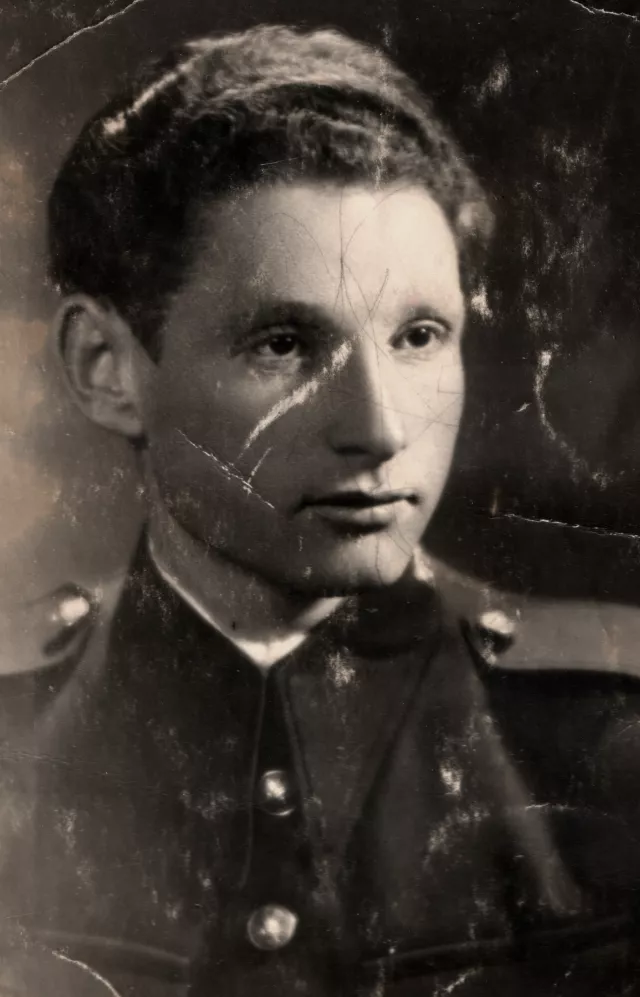This is me in the Czech army wearing a uniform of a private. I sent this photograph to my family in Velikiy Berezny. It was taken in a barrack of our regiment in Czechoslovakia in 1938. This is one of the pictures that my sister, Helena Zinger, put underneath the floor in our house before the Nazi invasion in 1940. We found this photo during repairs of the house in 1948.
I was recruited to the Czech army in 1936. I served in an infantry unit in Czechoslovakia. We had military and sport training and studied theory. There were rooms in the barracks, eight to ten tenants in each room. There were beds, tables and chairs, bookshelves and wardrobes in each room. There was a library in our unit and we could read in our spare time. We celebrated the religious holidays of all religions: Jewish, Catholic and Christian, every confession had its holidays. On Jewish holidays Jewish soldiers were invited to the synagogue where festive dinners of traditional Jewish food were arranged for them. Local Jewish families often invited Jewish soldiers to their homes on Sabbath and Jewish holidays. Matzah was delivered for the Jews from the synagogue on Pesach and for Christians Easter bread was made at Easter. The soldiers were allowed to go to the synagogue or church.
We didn't follow the kashrut, but I managed to observe all other Jewish laws. Every morning I put on my tallit and recited a prayer, and on Sabbath and Jewish holidays I went to the synagogue. Religiosity was appreciated. My fellow comrades were of various nationalities. There was one other Jewish soldier. There were Czechs and Hungarians. We never had any conflicts related to our nationality. Officers had a friendly attitude toward young soldiers. There were no brutal attitudes, nothing like what is happening in the Ukrainian army nowadays. We were like a team staying close together.
I returned home in 1939. Subcarpathia belonged to Hungary since 1938. The Hungary of this time was different from the Hungary where my parents lived when they were young. This was a fascist Hungary. There was a war in Poland and the Germans were killing Polish Jews. There were many refugees from Poland. Hungary declared itself an ally of Hitler's Germany. The oppression of Jews in Hungary began. A number of anti-Jewish laws were issued. Jews weren't allowed to own enterprises or stores. They had to give them voluntarily into non-Jewish ownership or they became property of the state. Then Hungarian passports were introduced. All Jews had to prove that they were born in Hungary or they were subject to deportation. I don't know where they were deported. Passports were issued in Budapest, the capital of Hungary. To go there was expensive. Jews had no right to hold official posts. Life became much more difficult.
Henrich Zinger
The Centropa Collection at USHMM
The Centropa archive has been acquired by the United States Holocaust Memorial Museum in Washington, DC.
USHMM will soon offer a Special Collections page for Centropa.
Academics please note: USHMM can provide you with original language word-for-word transcripts and high resolution photographs. All publications should be credited: "From the Centropa Collection at the United States Memorial Museum in Washington, DC". Please contact collection [at] centropa.org.














